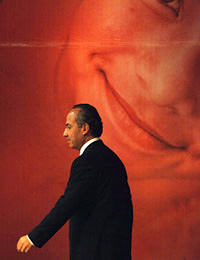 |
 |
 |
 News Around the Republic of Mexico | March 2007 News Around the Republic of Mexico | March 2007  
Calderón Gains Mexico's Approval
 Laurence Iliff/ - Dallas Morning News Laurence Iliff/ - Dallas Morning News


| | Following a rocky start in office, new president makes headway. |
Mexico City – President Felipe Calderón had to outsmart legislative opponents just to physically enter Congress and take the oath of office after last year's razor-close election. Now 100 days later, he's flying high in the polls and doing surprisingly well even with those who say the vote was fraudulent.

Recent polls by Mexico's largest national newspapers, Reforma and El Universal, both put Mr. Calderón's approval rating at 58 percent. That's not bad for a candidate who barely garnered 35 percent of the vote and won by just half a percentage point.

"In the popular perception of his figure and his rule, Calderón just clears the bar, but if we remember the great rejection that our actual president experienced in the days prior to his inauguration, then we can see that in 100 days he has accomplished a lot," wrote Germán Dehesa, a newspaper columnist and radio commentator.

Washington has been particularly pleased. Before President Bush's meeting with Mr. Calderón in Yucatán next week, a stream of U.S. Cabinet secretaries has visited the Mexican capital to praise booming trade and the extradition of drug lords.

Based on poll responses, Mr. Calderón's biggest success to date is a military-led crackdown against drug traffickers in major cities that had spun out of control in recent years. They include the Pacific Coast beach resort of Acapulco, which is preparing for spring break, and Nuevo Laredo on the border with Texas.

But his focus on public safety is only part of the equation. Mr. Calderón sold himself as the "jobs president" midway into his campaign last year. Creating jobs is more complicated than ordering military roadblocks and house-to-house searches, and unemployment is actually going up as the economy slows down.

Here is a look at how Mr. Calderón has fared on major issues during his first 100 days in office:

Public security

Not so long ago, Mexicans used to look at the level of gang violence and gun crimes in the United States with horror. Now they are living it. Mr. Calderón's first major action as president was to send thousands of troops and federal police into the central state of Michoacán, where brutal killings and beheadings had become almost a daily affair as part of a drug turf war.

Drugs and guns were seized and some alleged traffickers arrested, and the formula was repeated in additional cities and states. Critics say the actions are more sizzle than steak, with no arrests of major drug kingpins, and violence continuing under the noses of the very soldiers and police sent in to stop it.

"The operations are not designed to capture capos, they are designed to capture public attention," said historian Lorenzo Meyer. But Mexicans are generally supportive. The Reforma poll shows that 59 percent of those surveyed said Mr. Calderón was doing a "very good" or "good" job in the drug fight.

Mr. Calderón also announced a 46 percent pay raise for military personnel.

Economy

Mr. Calderón's first crisis after his inauguration was the tortilla crisis. The staple of the Mexican diet had been rising in price long before the new president took office Dec. 1, but the increases accelerated during the holidays and January. Mr. Calderón persuaded producers and retailers to hold the price at a maximum of 8.50 pesos (about 75 cents) for a kilogram (2.2 pounds), and the controversy quickly subsided.

But the "jobs president" appears to be failing in the area he stressed most heartily in his campaign. January unemployment rose to nearly 4 percent, up from 3.5 percent a year ago. That number sounds low because in Mexico people are considered employed if they are at least 14 years old and have worked even an hour a week, both in the formal and in the booming informal economy.

Mexicans complain mostly about underemployment and poor salaries, which drives many to migrate illegally to the United States. The Reforma survey showed that only a third of those surveyed thought Mr. Calderón was doing a good job on the employment front.

Poverty, social programs

Mr. Calderón said that he was going to pass his foes "on the left" by making the fight against poverty his own. His chief opponent, former Mexico City Mayor Andrés Manuel López Obrador, had long used the slogan "the poor come first." After launching the anti-drug fight, Mr. Calderón turned his attention to a series of social programs making health care available to every Mexican, providing 150,000 temporary jobs this year, extending tax incentives to encourage businesses to hire the elderly and disabled, and launching a series of development projects as part of his "100 actions in 100 days" promise. He also launched a school safety program.

The health care component has been applauded by most Mexicans in opinion polls, but the polls also show that a minority of Mexicans believe that Mr. Calderón is doing a good job on anti-poverty efforts in general. And the El Universal/Ipsos-Bimsa poll shows that only 9 percent of Mexicans believe the new president is favoring the poor, although 43 percent said he was favoring "all Mexicans." Forty-one percent said he was favoring the rich.

Political analyst Sergio Aguayo took Mr. Calderón to task for "his silence, his muteness, in the face of monopolies, grand created interests, the powers that be. His government has done nothing yet. It may later, but for now there has been no sign that it's an issue that worries him."

liliff@dallasnews.com | 
 | |
 |



